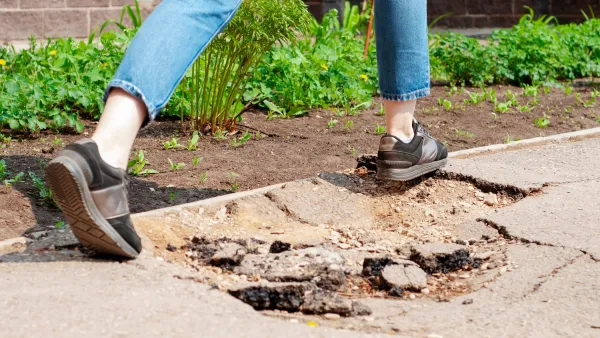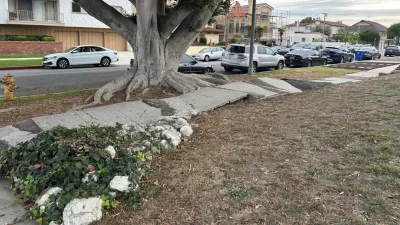A $6 million program takes aim at a backlog of thousands of requests for sidewalk maintenance, but critics say requiring property owners to foot half of the bill excludes less affluent neighborhoods.

The infusion of federal pandemic relief dollars is funding a $6 million program to fix broken sidewalks in St. Louis, as part of efforts to clear a years-long backlog of requests. According to a St. Louis Post-Dispatch article by Austin Huguelet, “There are at least 1,500 uneven, cracked or crumbling sidewalks awaiting service from the city’s repair program, and many people have heard help is coming before: At least 180 of the requests date back to 2017 or earlier.”
The city also found that old requests were, for a time, not rolling over year to year, meaning that unfulfilled requests disappeared without any action. In the summer of 2022, in response to a series of deadly crashes, the mayor’s office launched a plan “to spend tens of millions of dollars to redesign dangerous intersections, install traffic-slowing devices on major thoroughfares, and shore up the city’s beleaguered sidewalk program.”
Critics argue that the program’s funding structure, which requires property owners to pay 50 percent of the cost of sidewalk repairs, means that lower-income neighborhoods will be left with crumbling infrastructure.
FULL STORY: St. Louis residents have waited years for new sidewalks. Can the city catch up?

Planetizen Federal Action Tracker
A weekly monitor of how Trump’s orders and actions are impacting planners and planning in America.

Chicago’s Ghost Rails
Just beneath the surface of the modern city lie the remnants of its expansive early 20th-century streetcar system.

San Antonio and Austin are Fusing Into one Massive Megaregion
The region spanning the two central Texas cities is growing fast, posing challenges for local infrastructure and water supplies.

Since Zion's Shuttles Went Electric “The Smog is Gone”
Visitors to Zion National Park can enjoy the canyon via the nation’s first fully electric park shuttle system.

Trump Distributing DOT Safety Funds at 1/10 Rate of Biden
Funds for Safe Streets and other transportation safety and equity programs are being held up by administrative reviews and conflicts with the Trump administration’s priorities.

German Cities Subsidize Taxis for Women Amid Wave of Violence
Free or low-cost taxi rides can help women navigate cities more safely, but critics say the programs don't address the root causes of violence against women.
Urban Design for Planners 1: Software Tools
This six-course series explores essential urban design concepts using open source software and equips planners with the tools they need to participate fully in the urban design process.
Planning for Universal Design
Learn the tools for implementing Universal Design in planning regulations.
planning NEXT
Appalachian Highlands Housing Partners
Mpact (founded as Rail~Volution)
City of Camden Redevelopment Agency
City of Astoria
City of Portland
City of Laramie





























